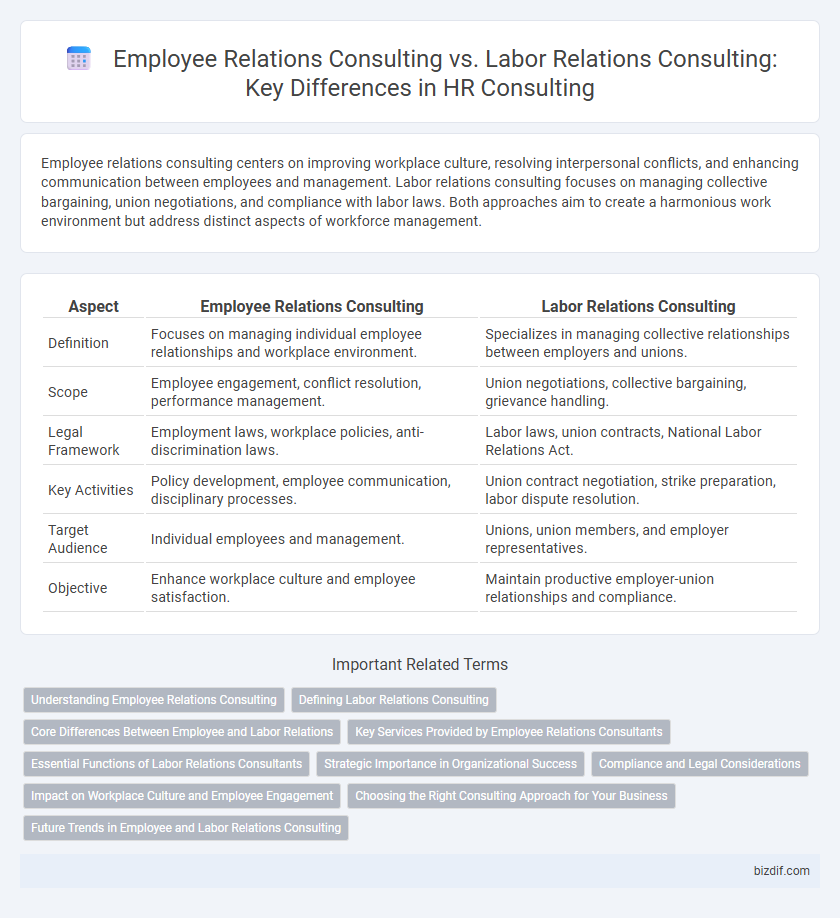Employee relations consulting centers on improving workplace culture, resolving interpersonal conflicts, and enhancing communication between employees and management. Labor relations consulting focuses on managing collective bargaining, union negotiations, and compliance with labor laws. Both approaches aim to create a harmonious work environment but address distinct aspects of workforce management.
Table of Comparison
| Aspect | Employee Relations Consulting | Labor Relations Consulting |
|---|---|---|
| Definition | Focuses on managing individual employee relationships and workplace environment. | Specializes in managing collective relationships between employers and unions. |
| Scope | Employee engagement, conflict resolution, performance management. | Union negotiations, collective bargaining, grievance handling. |
| Legal Framework | Employment laws, workplace policies, anti-discrimination laws. | Labor laws, union contracts, National Labor Relations Act. |
| Key Activities | Policy development, employee communication, disciplinary processes. | Union contract negotiation, strike preparation, labor dispute resolution. |
| Target Audience | Individual employees and management. | Unions, union members, and employer representatives. |
| Objective | Enhance workplace culture and employee satisfaction. | Maintain productive employer-union relationships and compliance. |
Understanding Employee Relations Consulting
Employee Relations Consulting focuses on improving communication, trust, and collaboration between employees and management to enhance workplace satisfaction and productivity. This consulting service addresses issues such as conflict resolution, employee engagement, and policy development, ensuring compliance with labor laws while fostering a positive organizational culture. By concentrating on individual and group dynamics within the workforce, Employee Relations Consulting differs from Labor Relations Consulting, which primarily deals with collective bargaining and union negotiations.
Defining Labor Relations Consulting
Labor Relations Consulting focuses on managing the relationship between employers and labor unions, emphasizing collective bargaining, grievance resolution, and compliance with labor laws. It involves strategic negotiation support to ensure harmonious union-management interactions and mitigate industrial disputes. This consulting type plays a critical role in maintaining organizational stability and legal conformity in unionized environments.
Core Differences Between Employee and Labor Relations
Employee Relations Consulting centers on fostering positive interactions between individual employees and management, emphasizing conflict resolution, employee engagement, and performance management. Labor Relations Consulting targets collective interactions, focusing on union negotiations, collective bargaining agreements, and compliance with labor laws. The core differences lie in employee relations addressing individual workplace issues, while labor relations manage collective workforce concerns and union dynamics.
Key Services Provided by Employee Relations Consultants
Employee Relations Consultants specialize in enhancing workplace communication, managing conflict resolution, and fostering positive employee engagement to boost organizational morale and productivity. They provide key services such as developing policies for employee conduct, advising on performance management strategies, and facilitating training on workplace behavior and compliance. Their expertise ensures a harmonious work environment, reduces turnover rates, and supports adherence to labor laws and internal regulations.
Essential Functions of Labor Relations Consultants
Labor Relations Consultants specialize in managing collective bargaining processes, negotiating labor contracts, and addressing grievances between employers and unions to ensure compliance with labor laws. They conduct labor market analysis, facilitate union-management communication, and implement strategies that foster cooperative labor relations. Their expertise includes dispute resolution, labor policy development, and guiding organizations through regulatory changes impacting unionized workforces.
Strategic Importance in Organizational Success
Employee Relations Consulting focuses on fostering positive workplace culture and resolving individual employee issues to enhance engagement and productivity. Labor Relations Consulting specializes in managing collective bargaining, union negotiations, and compliance with labor laws to mitigate risks and ensure organizational stability. Both are strategically important as effective employee and labor relations directly impact organizational success through improved workforce morale, reduced turnover, and minimized legal disputes.
Compliance and Legal Considerations
Employee Relations Consulting focuses on fostering positive workplace environments by addressing employee grievances, performance management, and compliance with internal policies and employment laws such as the Fair Labor Standards Act (FLSA) and the Equal Employment Opportunity Commission (EEOC) regulations. Labor Relations Consulting specializes in managing relationships with unions, collective bargaining agreements, grievance procedures, and ensuring compliance with the National Labor Relations Act (NLRA) and other labor laws governing unionized workforces. Both consulting areas require deep legal knowledge to help organizations mitigate risks, avoid litigation, and maintain regulatory compliance in complex employment and labor landscapes.
Impact on Workplace Culture and Employee Engagement
Employee relations consulting emphasizes fostering positive interactions and trust between employees and management, which significantly enhances workplace culture and boosts employee engagement through effective conflict resolution and communication strategies. Labor relations consulting focuses more on managing union relationships and collective bargaining, impacting workplace culture by ensuring compliance with labor laws and maintaining industrial peace. Both approaches are critical for sustaining a collaborative environment, yet employee relations consulting often drives higher immediate morale and engagement levels by addressing individual employee concerns.
Choosing the Right Consulting Approach for Your Business
Employee Relations Consulting focuses on enhancing workplace culture, communication, and conflict resolution between employees and management to boost productivity and morale. Labor Relations Consulting specializes in managing union interactions, collective bargaining agreements, and compliance with labor laws to mitigate risks and ensure fair labor practices. Selecting the right consulting approach depends on whether your business requires improving internal employee dynamics or navigating complex union negotiations and labor regulations.
Future Trends in Employee and Labor Relations Consulting
Future trends in employee and labor relations consulting emphasize digital transformation and data-driven decision-making to enhance communication and conflict resolution strategies. Increasing focus on diversity, equity, and inclusion (DEI) initiatives is shaping policies, with AI-powered tools facilitating predictive analytics for workforce sentiment and compliance management. Consultants are adapting to remote and hybrid work models by developing flexible engagement frameworks that address evolving legal regulations and employee expectations.
Employee Relations Consulting vs Labor Relations Consulting Infographic

 bizdif.com
bizdif.com